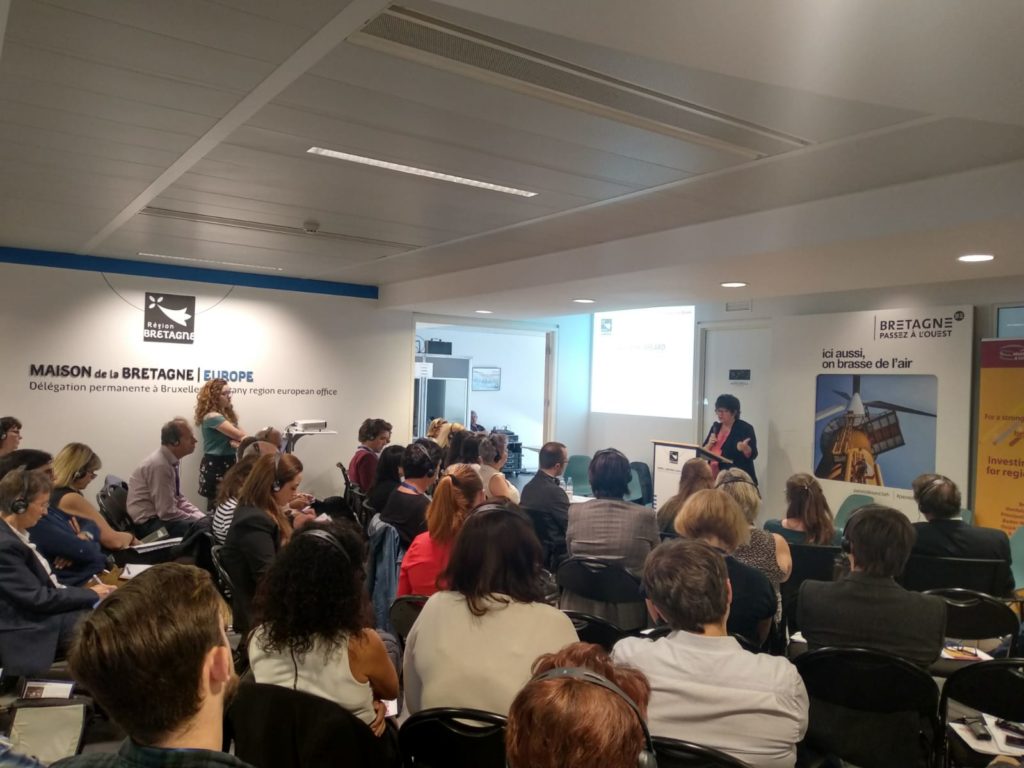Fostering Human Capital: Full House at Maison de la Bretagne | Europe during #EURegionsWeek
19/10/2018

Fostering human capital is crucial for a successful regional development both in terms of international competitiveness and local wellbeing. People (students, workers, teachers, trainers and employers) must be put at the centre of the system and the human factor must be taken into account at all times. To this end, connection of VET with regional priorities (and not the other way around) has proven to be a key factor for getting closer to the companies’ needs and involving relevant stakeholders. Taking this into account, regional representatives met at the House of Brittany in Brussels to discuss why investing in people is key to achieve territorial development.
The session was hosted by Georgette Bréard, Second Vice President of the Regional Council of Brittany in charge of Training, Learning and Guidance, who called for reinforced regional efforts to answer the European demands of social inclusion, equality of opportunities, economic development and territorial cohesion. She suggested to the EU representatives in the room a re-examination of the link between ESF+ (MFF 2021-2027) and the European Semester, which disregards the essential position of regions. Specific needs and territorial inequalities will continue to raise challenges, and regional expertise provides a unique tool to face them.
Alexia Samuel, from the European Commission’s DG EMPL presented a policy state of play in the area of skills, touching on the European Pillar of Social Rights, the European Agenda for Adult Learning, the Riga Conclusions, and the New Skills Agenda. She also introduced opportunities for funding of skills in the next MFF 2021-2027 under the “Cohesion and Values” chapter: ESF+, Erasmus, and the European Solidarity Corps.
Regional case presentations followed. Marta Marín, delegate of the Basque Country to the EU introduced the Basque VET system, supported by the Basque VET Law approved in July 2018. Key success factors are a long‑term strategic planning, the human dimension, motivation of teaching staff, and contact with businesses.
Rolf Ackermann, from Baden-Württemberg’s Regional Ministry for Education, Culture and Sports presented three EU-funded projects (TALENTS, FIER and BRIDGE+) that have been possible thanks to international networks and trustful partnerships. Then, Ms. Bréard took the floor to explain Brittany’s regional pact (“A learning Brittany”), articulated around five axis for growth and training: a) getting closer to the public; b) transforming the training offer by looking at other European regions; c) making recruitment easier; d) developing learning territories; and e) transforming the operational cooperation modalities. The aim is to use training as a driving force for economic development and include challenges of adaptation in the process.
Eva Ledo, from the Regional Ministry of Education and Culture of the Principality of Asturias, presented their dual VET and teacher training programmes, both with very high enrolment, demand and participation rates. This is only possible by means of a strong cooperation with the private sector and the employment area of the government in terms of guidance, in-company education and business demands.
Brigita Ivoševac, from Osijek-Baranja, explained the Croatian initiative for “regional competence centres,” aimed not only at upgrading VET, but also at creating possibilities for regional growth by cooperating with different stakeholders. Lastly, Kate Clarke, from Hordaland County Council, presented the Stord model, a unique training concept created due to pressures from local industry in the municipality of Stord.
At the end of the session, #FosteringHumanCapital was the hashtag created by one of the participants to wrap up the debate. The best practices presented were also evaluated as triggers for smart specialisation by representatives from the European Commission’s Joint Research Centre.
Useful Links
- European Week of Regions and Cities 2018
- EARLALL at the #EURegionsWeek 2018
- Downloadable version of all presentations
- European Commission’s Proposal for ESF+ (MFF 2021-2027)




